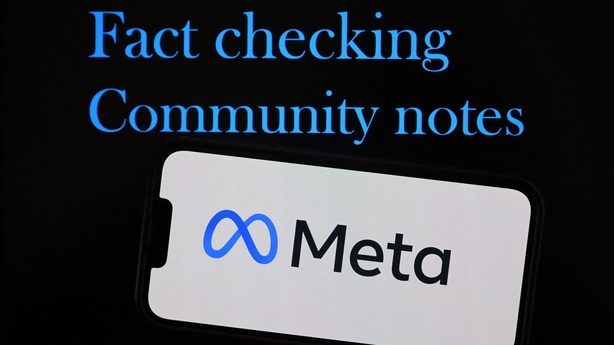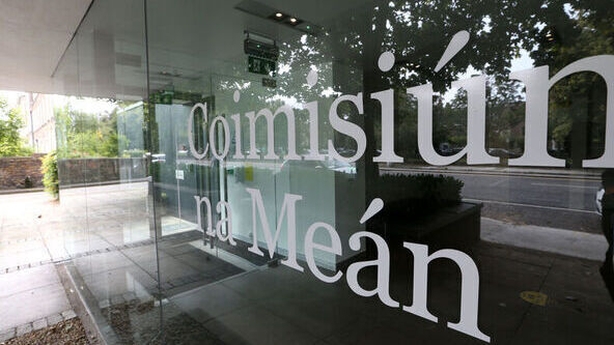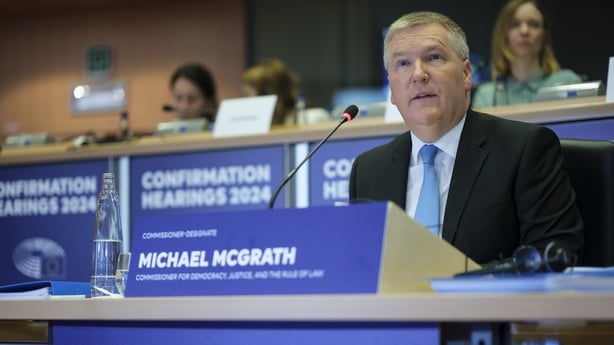As welcomes to 2025 go, this one was particularly interesting.
"Hey everyone!"
Who, me? Well, when you have three billion users globally, I suppose "everyone" is a legitimate greeting - do go on.
"I want to talk about something important today."
Okay.
It is Tuesday, 7 January and when one of the giants of the social media world, Meta CEO Mark Zuckerberg, says in a video that he has "something important" to say, reporters around the world grab their headsets.
"It's time to get back to our roots around free expression on Facebook and Instagram."
And for the next few minutes, one of the most recognisable faces in the world outlined his new business plans in a surprisingly low key and unadorned video, filter free with no fancy emojis.
Free expression. Sounds quaint, but this plays into one of the issues of our times.
Since the visible rise of the big bosses of American tech companies on the public stage, the subjects of censorship, regulation, and freedom of expression have become dominant themes in public discourse.
Meta has been on quite a journey, for an entity that began life sharing photos from Harvard dorms.
As one of the largest players - and it should be said a large employer in Ireland and whose platforms are widely used in politics - Meta is an obvious example.
On Tuesday, it was Mark Zuckerberg's turn to outline his first public policy shift of 2025 on the subject for Meta, and it instantly made global headlines.
"First, we're going to get rid of fact-checkers and replace them with community notes similar to X starting in the US," Mr Zuckerberg confirmed.
Here the founder of Meta - a company valued at $1.6 trillion on the stock market, with Facebook, Instagram and WhatsApp under his leadership, explained how "fact-checkers have just been too politically biased and have destroyed more trust than they've created, especially in the US".
The video covers an astonishing amount of ground, laying out a clear future plan for Meta's strategies ahead of the Trump presidential era.
As global analysts rushed to parse Mr Zuckerberg's words, questions were being asked: what does this mean for users, and what does it entail for regulators too?
There has been a wave of mixed reactions.
US President Biden went so far as to describing the move as "shameful" last night.

Replacing fact checkers with "a comprehensive community notes system" similar to X, is a significant move of course, altering the path for regulation, but once Donald Trump - a fierce critic of restrictions on freedom of expression - was elected, challenges to the regulators were inevitable.
There have been hints that this more relaxed policy to fact checking from Meta was pending.
On 3 December 2024, a piece on Meta's site, titled 'What we saw on our platforms during 2024's global elections', observes that "we know that when enforcing our policies, our error rates are too high, which gets in the way of the free expression we set out to enable".
A few clues dropped there.
Interestingly that article was authored by Nick Clegg, President of Global Affairs, (formerly known as the leader of the UK's Liberal Democrats and the country's deputy prime minster) in December.
By Thursday 2 January, Clegg had announced he was stepping down from Meta.
His replacement is Joel Kaplan, a long-time executive and former senior advisor to the Republican party.
These signals that Meta is strengthening its ties to the pending Trump administration - which includes the complete Republican control of all three branches of the US government - has consequences for the EU.
When managing content on online platforms, the most important tool for the EU is its Digital Services Act (DSA).
It requires online platforms to act when it comes to removing harmful content and tackling the spread of disinformation.
Here at home, Irish media regulator Coimisiún na Meán has been tasked with enforcing the DSA in Ireland and, because so many of the big tech firms have their European headquarters in Ireland, the Irish regulator also has a role in dealing with complaints from other EU countries.
An Coimisiún was out the day after Mr Zuckerberg's video with a statement saying that it is "engaged with Meta as part of our ongoing supervisory process to ensure compliance with the Digital Services Act (DSA)".
They added that in relation to the new policy announcement by Zuckerberg they "will engage with Meta on their decision relating to Community Standards and the impact this might have on EU users".
There was also a key phrase in this response from Coimisiún na Meán too which noted that "Meta's statement in relation to its fact-checking programme indicates that it applies only to the United States currently and not to users within the European Union".
But if, for example, a US user creates a post which would have been stopped by US fact checkers in 2024, but will now be published on Meta in 2025, what tools does the EU have to manage that post?
The law under the DSA is clearly laid out, and includes areas such as online violence threats which are deemed illegal.
Under the terms of the act, online platforms "must provide a way for people to report content they think is illegal and platforms must respond".
There is a process and ultimately, there are hefty penalties in place.
Companies face fines of up to 6% of global turnover for violating the rules and could be banned from doing business in the EU for repeated breaches.

For Dr Roddy Flynn from the School of Communications in Dublin City University, he does not expect that users are going to see anything radically different, certainly in the next year in terms of what is coming down their news feed, "because the regulatory contexts are so different here".
He points to the EU DSA and outlines his view that "Zuckerberg might talk about relaxing the content rules relating to gender and to immigration for example, but there's no digital services act operational in the United States, which we have in the EU directive".
He explains that the DSA specifically prohibits a range of content, for example "incitement to hatred on the basis of, say, gender or ethnicity … so (Mark Zuckerberg) may want to roll back on those things in the States, and there's greater flexibility to do so, because it is a bit more of the wild west, if you like, in terms of social media regulation. It's not true of Europe".
The European Commission, the EU executive, says its Digital Services Act does "not force or request platforms to remove lawful content but only to take down content that may be harmful, such as to children or to the EU's democracies".
The commission also said EU users would continue to benefit from input from independent fact-checking of content posted in the United States.
A quick look at the Irish media regulator's website clarifies too that "Coimisiún na Meán" does not have powers to "compel the immediate removal of illegal content from online platforms … our role is to make sure that the platforms' content reporting systems are working effectively in compliance with the law".
But while it looks very effective on the EU information websites, in an online world where borders and regions are blurred, what are the future concerns?
Business journalist Tom Lyons from The Currency, who has been following the growth of big tech companies in Ireland, told RTÉ News that the implications of Mark Zuckerberg's announcement for Ireland are "still quite unclear".
He said that while Coimisiún na Meán has said that they are engaging with Meta and that for the moment, it does not appear that these new rules are going to apply to Europe, Mr Lyons said "we just don't know," adding "we have seen with Elon Musk ... that he has applied the same rules in the United States in Europe."
Mr Lyons asks: "Is Meta going to follow suit, running two parallel Facebooks and parallel instagrams? … that's going to add an awful lot of expense and hassle … so I'd say that there'll certaintly be a temptation for Mark Zuckerberg to decide 'Why don't I push through the same two systems on both continents and just leave it up to the regulators to decide?'"
For the European Commission's part, it came out fighting, firmly rejecting the claims in the video by Zuckerberg that "Europe has an ever-increasing number of laws, institutionalizing censorship".
Spokesperson Paulo Pinho told reporters that "we absolutely refute any claims of censorship on our side".
Interestingly for Irish observers too, the specific EU Commissioner responsible for democracy, justice the rule of law, and Consumer protection is from Cork.

Newly-appointed Commissioner Michael McGrath, has a range of responsibilities including "putting in place a new European Democracy Shield, including the fight against disinformation, foreign information manipulation and interference".
On 17 December last, Commissioner McGrath gave the closing statement at a session on misinformation and disinformation on social media platforms.
He began by describing the DSA as a "crucial legal instrument, contributing to safeguarding democratic debate and the integrity of electoral processes in the online sphere, while protecting freedom of speech".
He added that "the freedom of expression is a fundamental right enshrined in the charter of fundamental rights, and I and my colleagues will stand over that freedom all of the time".
For all the fighting words though, Tom Lyons describes it as somewhat of a "David versus Goliath" situation for the Irish regulator in particular.
"If you look at the regulator taking on somebody like Mark Zuckerberg, whose personal wealth is over $200 billion … Meta is a ginormous company and Donald Trump is running one of the world’s biggest economies. It's going to be an extremely challenging situation for a small, new organisation like Coimisiún na Meán to say 'we can take on these giants'", he said.
Mr Zuckerberg ended his video message by saying it is time to get "back to our roots about giving people voice. I'm looking forward to this next chapter. Stay good out there, and more to come soon. Thank you. Nice to meet you."
It was a five minute and 18 second long video.
If that's how long it takes to change the online world now, regulators are going to need strong political will and the full impact of its legal tools to face this new era.
Welcome to 2025.







